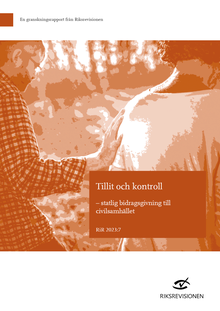Strengthening control on grants to civil society is necessary
Central government control of grants to civil society organisations is too weak. There is thus a risk of fraud and misuse, which may mean that urgent activities are crowded out and that confidence in central government grants is undermined.

Photo: plainpicture
The Government allocates more than SEK 20 billion to civil society organisations every year. The Swedish National Audit Office (Swedish NAO) has audited central government grants at four central government agencies: The Swedish Gender Equality Agency, the Swedish Agency for Support to Faith Communities, the Swedish Agency for Youth and Civil Society, and the National Board of Health and Welfare, which together distribute just over SEK 1.4 billion per year.
The audit shows that the agencies’ control measures are inadequate. The government agencies rely to a large extent on the information provided in the grant applications, and only to a limited extent carry out visits to the activities or online controls. Unscrupulous actors can thus use the funds and the grants for purposes other than those intended.
“The allocation of grants to civil society is based on a convention of trust. At the same time, the risk of fraud and misuse has increased in recent years. The controls therefore need to be strengthened,” says Leif Svensson, Project Leader for the audit.
The government authorities need to apply a more risk-based approach and develop their control methods. There is also a need for national support within certain specialised competencies, such as economic crime, violent extremism, and democracy issues.
In addition, an increased exchange of information between government agencies would provide a positive contribution. Today, there is no overall picture of which grants are allocated to which organisations, making it difficult for government agencies to identify whether an organisation is being doubly financed or overcompensated.
The Swedish NAO considers that a central database of available government grants to civil society would increase transparency, which would benefit both government agencies and grant-seeking organisations.
“The Government needs to simplify so that government agencies can work effectively in detecting possible inaccuracies,” says Auditor General Helena Lindberg.
The audit also shows that the Government’s control has been weak. For example, the grants are not included in the Government’s systematic efforts to combat incorrect payments. There are also no objectives subject to Riksdag decisions to reduce incorrect payments to civil society.
Recommendations
The Government is recommended to:
- Task a suitable government agency with establishing a central database that includes all available government grants to civil society and the organisations that have received such support.
- Task suitable agencies with establishing national support functions concerning material risks in connection with grant allocation to civil society. The support functions must be able to provide grant-giving agencies with special competencies concerning financial risks, violent extremism, and non-democratic activities.
- Task grant-giving agencies with developing and strengthening control, for example by increasing the frequency of risk-based visits to organisations.Task grant-giving agencies with improving grant recipients’ opportunities to fulfil the grant requirements, for example by providing basic training concerning requirements placed on organisations that receive grants.
Press contact: Olle Castelius, phone: +46 8-5171 40 04.
Presskontakt: Olle Castelius , telefon: 08-5171 42 06.
Share in social media and by e-mail
Contact form
Send your questions or comments via the form below and we will make sure that they reach the right member of staff. Please state if your question concerns the information on this particular page.


